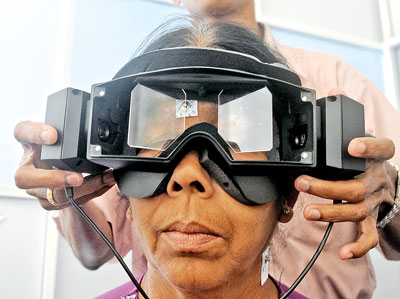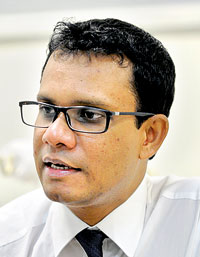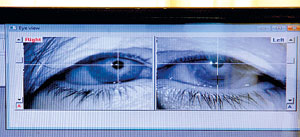Giving ear to balance, hearing needs
View(s):The Anuradhapura ENT Unit is making its mark as the only state hospital with its very own state-of-the-art Vestibular & Balance Testing Laboratory in Sri Lanka. Kumudini Hettiarachchi reports

Heenmenike undergoing tests. Pix by Amila Gamage
It is a busy day at this Ear, Nose and Throat (ENT) Unit, for special services unique only to the Anuradhapura Teaching Hospital, can be accessed by people in addition to the usual tests and treatment provided as at other major state city hospitals.
Slowly and silently, without much fanfare, Anuradhapura’s ENT Unit is making waves, having taken the treatment of vestibular (balance) disorders to new and different heights, while also dealing with hearing impairment in its varied forms. This has resulted in this unit creating its own niche as the ‘balance’ and ‘hearing’ treatment hub of the North Central Province as well as the whole country.
This is the only state hospital with its very own state-of-the-art Vestibular & Balance Testing Laboratory in Sri Lanka which had been opened in February this year by the Director-General of Health Services, Dr. Palitha Mahipala, who has been of immense support seeing the potential of this hospital. Already nearly 500 patients have benefited from this laboratory (see box please), in addition to the stream of men, women and children who seek other routine treatment, even though the ENT Unit is woefully short-staffed.
As the country welcomes the New Year of 2017, this ENT Unit has a multi-pronged vision – to continue to keep the high standards of care, treatment and rehabilitation for all those who access the Vestibular & Balance Testing Laboratory, while strengthening its services through a multidisciplinary team approach, bringing into the fold the expertise of Consultant Neurologists and Psychiatrists. It will also aspire to be a Training and Research Centre for health personnel from across the country.
This ENT team has another hope, to embark on cochlear implantation for children with congenital hearing impairment, after setting in place the required facilities as the skills are already available here. Currently, cochlear implantation is performed only at the Lady Ridgeway Hospital for Children in Colombo and the Sirimavo Bandaranaike Children’s Hospital in Peradeniya and more recently the National Hospital of Sri Lanka in Colombo.
While at present, the unit is only performing diagnostic tests to check out the hearing of newborns with possible risk factors if the screening tests fail, next year the team hopes to screen all newborns at the Anuradhapura Hospital routinely, followed by necessary action.

Dr. Daminda Dumingoarachchi
Referring to their ‘baby’, the Vestibular & Balance Testing Laboratory, of which the team is justifiably proud, one of two Consultant ENT Surgeons serving at the Anuradhapura Hospital, Dr. Daminda Dumingoarachchi, pointing out that there are numerous tests to check out heart, liver or kidney failure. However, earlier for ear issues such as vestibular failure (failure of the balance-sensing organ of the inner ear) diagnosis had to be made after taking a case history. Sometimes it could be difficult to make a proper diagnosis.
Now, that is the past, MediScene learns, with Dr. Dumingoarachchi adding that they have all the facilities which enable accurate diagnosis, based on the right investigations. This is followed by treatment and rehabilitation, where necessary.
Citing the example of vertigo (feeling off-balance) which affects a lot of people, he explains that a detailed case history is taken followed by a neurological examination. If a diagnosis cannot be made a vestibular investigation is performed.
Explanations in action, using skills and facilities, MediScene sees at first-hand in the case of M.A. Heenmenike from Srawasthipura who has been assailed by bouts of dizziness. “Kalanthayak saha kerakilla thiyenawa. Visikarana wage denenawa. Nidi maranna be. Bellen kekkumak enava,” she says, adding that she feels faint and dizzy and as if she is getting thrown about. She cannot break rest and there is a pain emanating from her neck.
Diagnosed with long-term vertigo, she is being tested to find out the contributory causes. Seated in a tiny but airy and cozy room on the first-floor of the Anuradhapura Hospital’s JICA building, Heenmenike has tubes and wires snaking from her face, while some equipment lies on her lap. This is the test for VEMP. Later she lies on the bed and the tests are continued.
Gently, Audiology Technician Duminda Damsen explains what he will be doing and the test begins – to check Heenmenike’s vestibular function through the ‘caloric stimulation test’, under which he will deliver cool and warm air respectively to each ear separately to stimulate the ear canals which are linked to balance.

Dedicated ENT team: Some of the team members
It is Dr. Dumingoarachchi who explains the inner ear-eye connection (vestibular and ocular systems). These two systems are not only connected to each other but also to the muscles in the eyes and neck which help us keep our balance. Our head movements or any stimulation of the inner ear give out signals through the nervous system to control the movements of the eye muscle. This pathway is known as the ‘vestibulo-ocular reflex’ (VOR) and helps a person to have eye movements to keep a clear vision when the head is in motion.
This is why vestibular stimulation tests check out the eye movement, he says adding that when the cool or warm air enters the ear-canal (as MediScene sees in the case of Heenmenike), the inner ear changes temperature and causes rapid side-to-side involuntary eye movements. These are called nystagmus. The eye on the side of the ear which is thus being “irrigated” should turn towards it and slowly get back to its usual position.
Since March this year, this is just one of the ‘balance’ tests among numerous others the dedicated ENT team has been performing. The team is headed by Consultant ENT Surgeons Dr. Daminda Dumingoarachchi & Dr. Upul Abeysundara and comprises Registrars Dr. Kantha Jayasena & Dr. Balasubramaniyam Abarna; Medical Officers Dr. C.S. Prasad, Dr. Eindrini Muhandiram, Dr. Shakila Wimalasooriya, Dr. Sampath Ranasinghe, Dr. Dilushi Galagedara & Dr. Janaka Herath; Audiology Technician Duminda Damsen; and Nursing Officer Kumudini Ramanayaka.
Pioneering vestibular tests  Recording the eye movements in ‘caloric stimulation’ The ‘special’ vestibular tests, not available elsewhere in the state-sector, carried out at the ENT Unit of the Anuradhapura Teaching Hospital include: During this test which is done to ascertain whether there is vestibular dysfunction or a neurological problem, the audiographer asks questions to keep the patient alert. This test includes the evaluation of the eye-movements as they follow different targets or when the head is placed in various positions. Another prong of this test is ‘caloric stimulation’, with changes in the temperature (either with warm and cool air or water) of the ear canal which, in turn, stimulates a section of the vestibular system. This results in ‘jerking’ eye movements or nystagmus. Vestibular Evoked Myogenic Potential (VEMP) – This test is performed to determine whether vestibular organs and their associated nerves are intact and working well, by attaching electrodes to the skin surfaces of various muscles in the neck and around the eyes. The patient is then asked to wear earphones and sound is played for a few seconds, to stimulate the vestibular organs and activate the muscle responses which are then recorded by the electrodes. | |


